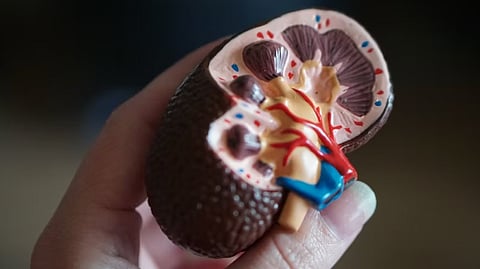A 55-year-old man was admitted to the emergency department in critical condition and subsequently underwent a complex and delicate nephrectomy.
The patient, who had been living with autosomal dominant polycystic kidney disease (ADPKD), presented with severe abdominal pain and blood in his urine at Medicover Hospital, Navi Mumbai, Maharashtra. He had been on dialysis for years. ADPKD is characterized by progressive cyst formation in the kidneys, leading to impaired renal function. In this case, the patient had enormous cysts, one reaching 35 cm in size, necessitating urgent surgical intervention.
The surgical team, led by Dr. Vikas Bhise, a consultant urologist at Medicover Hospital, performed the procedure. Upon arrival, the patient was hypotensive, having lost significant blood through his urine. His abdomen was severely distended due to the massive kidney mass. According to Dr. Bhise, while ADPKD is a known genetic condition, such an unusually large kidney mass is rare. The patient was in a life-threatening condition, requiring immediate surgery to prevent complications such as shock or excessive blood loss.
Given the dimensions and complexity of the kidney mass, the surgical intervention posed significant challenges. Dr. Bhise explained that the cysts had occupied the entire abdomen, making a laparoscopic procedure impossible. The team opted for an open surgery approach. Despite the complexity, the surgery was completed in two hours with minimal blood loss, and the patient did not require a postoperative blood transfusion. He recovered quickly and was discharged three days later.
Before the surgery, the patient had been enduring severe emotional and physical distress. He relied heavily on his family for support while dealing with constant pain and uncertainty about his condition and preparing for a kidney transplant. Following the surgery, the patient made a remarkable recovery, regaining his independence and achieving a significantly improved quality of life. [1]


